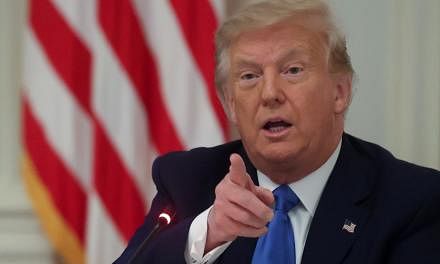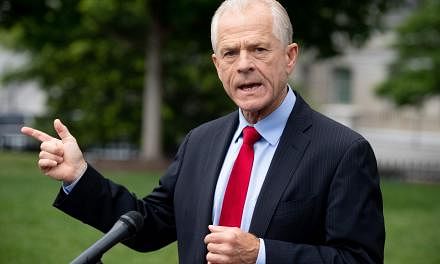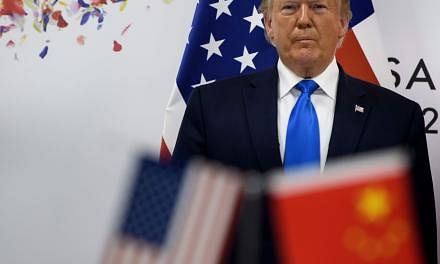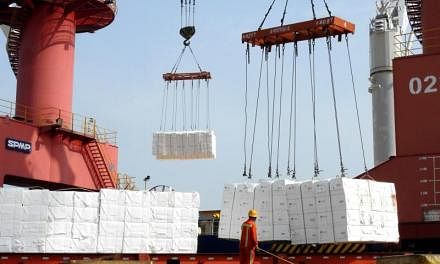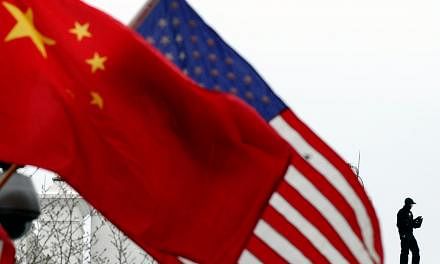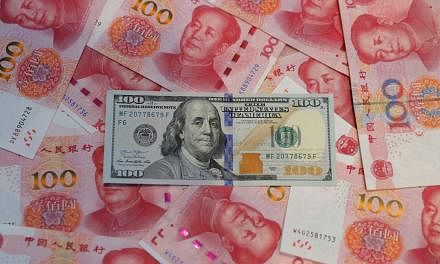FUKUOKA, JAPAN (BLOOMBERG, REUTERS) - US Treasury Secretary Steven Mnuchin tweeted that he had a candid and constructive talk on trade issues with People's Bank of China Governor Yi Gang.
Mr Mnuchin had earlier played down expectations for the meeting with Mr Yi, which took place on the sidelines of the annual Group of 20 meeting of finance ministers and central bankers in Fukuoka, Japan.
He had foreshadowed that no big announcement was expected and that the main progress would occur at a meeting between presidents Donald Trump and Xi Jinping at the G-20 leaders' summit in Osaka at the end of the month.
Trade negotiations have been on hold since the US ramped up tariffs on Chinese imports last month, prompting a retaliatory move from China, after a breakdown in talks.
Mr Mnuchin departs from the G-20 early evening Sunday and is not expected to make any further public statements on China trade talks.
During a briefing on Saturday in Fukuoka, Mr Mnuchin said that if China wants "to come back to the table and have a real agreement we will negotiate. If not, we'll go forward with our plan" to impose more tariffs.
Asked about China's currency on Saturday, he attributed its recent decline to market forces and the absence of intervention.
"When you have intervention in a market for a long period of time and then they don't intervene, the market could view that as a desire to have the currency weaken," he said.
The Treasury Department issued its semi-annual foreign-exchange report to Congress last month, in which no country was named as a manipulator. China remains on its watchlist.
Mr Mnuchin has said that the trade talks broke down last month because Beijing reneged on provisions of a tentative deal. Mr Trump raised tariffs on about US$200 billion (S$272 billion) in Chinese imports to 25 per cent in response, and at the time hung out the possibility of further action.
China has blamed the US for the breakdown and vowed to reciprocate for the increased tariffs in various ways. The country has hinted at cutting off the US supply of rare earth elements and is also hitting America's education and tourist sector by announcing visa restrictions.
Mr Trump has said he will decide whether to enact tariffs on another US$325 billion in Chinese imports after the G-20 leaders' summit in Osaka, Japan, later this month. Mr Mnuchin said that meeting would be pivotal in determining the direction of the trade war.
Mr Trump continues to publicly say that he is happy to impose more tariffs on China if it does not agree to his terms. The fact that Mexico yielded to Mr Trump's threat of more tariffs, promising last Friday to take tougher measures to secure its shared border with the US, could embolden the President further when it comes to China.
Mr Yi said in an interview with Bloomberg News last Friday that the discussion of trade with Mr Mnuchin would be "uncertain and difficult", and he insisted that China could withstand a prolonged trade fight with the US.
The US and China have largely been at a stand-off since negotiations broke down last month. The countries were unable to find a compromise on Mr Trump's tariffs, with the US arguing for keeping many of them and Beijing insisting that they must come off as part of any trade deal.
The US wants China to accelerate the opening of its market, improve protections for intellectual property and commit to big purchases of US products.
But talks faltered at the beginning of last month when China was said to have made significant alterations to the text of the agreement. The Trump administration had been pushing for any changes to be codified in Chinese law, but US officials said that Beijing backtracked and refused to make any legal changes as part of the deal.
Since then, the two sides have only hardened their positions. China threatened to compile a blacklist of foreign companies and individuals that it considered "unreliable" and published a White Paper last weekend arguing that the country would "never give in on major issues of principle".
The Trump administration also answered harshly. In a statement on June 3, the US Trade Representative and the Treasury Department accused China of pursuing "a blame game misrepresenting the nature and history of trade negotiations between the two countries".
"Our negotiating positions have been consistent throughout these talks, and China backpedalled on important elements of what the parties had agreed to," the US statement said.
Meanwhile, the Trump administration has been moving ahead with plans to impose 25 per cent tariffs on the remaining roughly US$300 billion of goods from China, and companies are becoming more concerned about the rapid increase in prices on a range of goods, including furniture, toys, mobile phones and sneakers.
On June 17, a hearing is to be held in Washington to allow companies to weigh in on the impact of the tariffs.
Mr Mnuchin said on Saturday that the US would probably complete the review process on the tariffs before Mr Trump meets Mr Xi.
"President Trump hasn't made any decisions at the moment," Mr Mnuchin said. "All options are on the table."


